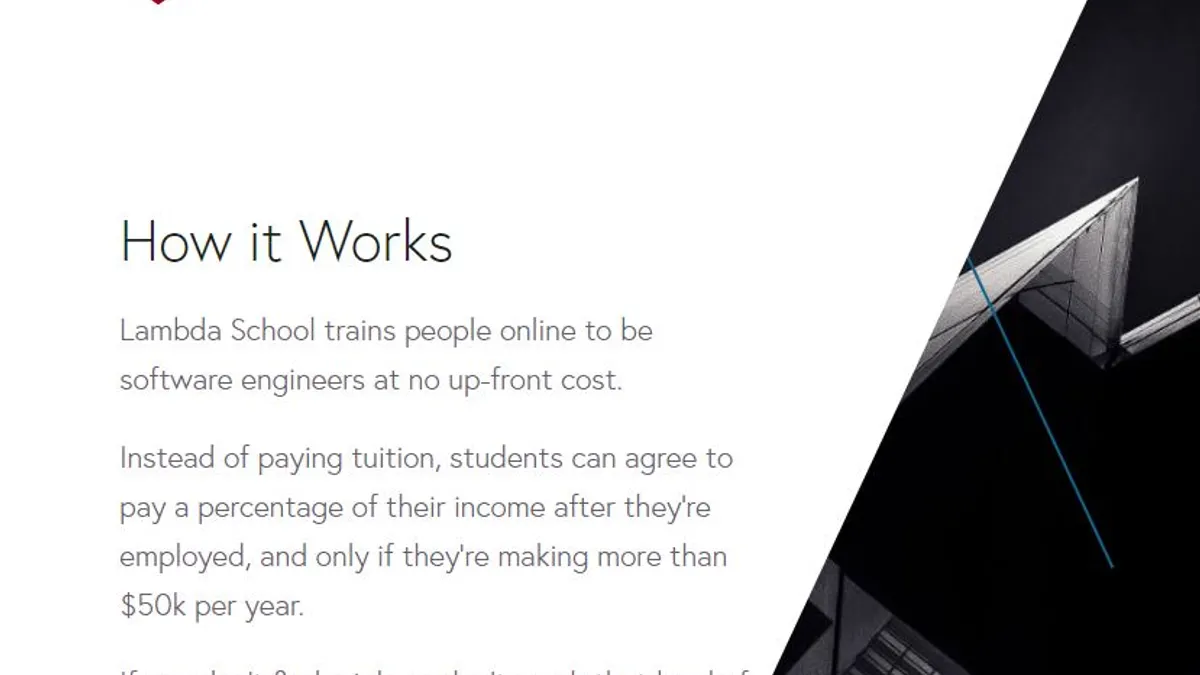Dive Brief:
- Online coding and programming academy Lambda School, which uses an income share financing model for students, has raised $30 million in Series B venture capital financing, according to Crunchbase. Leading the funding round is Geoff Lewis, founder and managing partner of investment firm Bedrock Capital.
- Lambda CEO and co-founder Austen Allred said the funding would be used to scale the school, build its hiring network and expand internationally. This week Lambda courses opened to participants in the European Union, Allred said, and they will be available in Canada in the coming months. It's also planning a cybersecurity program.
- Rather than charge students upfront, Lambda uses income share agreements for tuition. Students who earn at least $50,000 a year pay 17% of their income to Lambda for two years, for a maximum of $30,000 in retroactive tuition. It currently enrolls 1,000 students, Allred said. To date, Lambda has raised $48.1 million in five funding rounds, according to Crunchbase. Other investors include Y Combinator, actor and investor Ashton Kutcher, and GV (formerly Google Ventures).
Dive Insight:
Income share agreements, or ISAs, are often cast as a way to reduce student debt and shift how institutions think about their students. As The New York Times' Andrew Ross Sorkin wrote of Lambda this week, they represent "an approach meant to treat students as investments rather than cash cows." But ISAs are still largely unproven in higher ed and bring many questions when it comes to scaling.
Lambda says 83% of its graduates are hired within six months of completing the program and have a median starting salary of $70,000, landing jobs at Uber, Nordstrom, Smart Data Systems and elsewhere. The school, it's worth noting, has only existed since April 2017.
Other ISA models are out there. Lumni, Better Future Forward, Vemo, Upstart and others have made a go of it. Yet in the spring of 2017, Business Insider reported that only "a couple of thousand" students had financed college with ISAs. Some such programs have already failed. Upstart's marketing of income share agreements ended relatively quickly. MissionU, which aimed to replace traditional college entirely, sold itself to WeWork last year. The coworking company planned to wind down college operations after the deal.
For Lambda's part, Allred said the company would become "profitable very quickly" if it were to stop growing (and thus spending money on expansion).
Along with ISAs' viability, others have questioned whether they are a good deal for students. New America's Clare McCann and Sophie Nguyen wrote in 2017 that the arrangements "aren't a solution to student debt," noting that "with ISAs, borrowers could easily wind up paying well over what they would with a federal student loan for the same amount of upfront money."
Moreover, as Lindsay Gellman noted in The Atlantic, many tech-focused programs with ISAs are not accredited, including Lambda. That means the schools can't receive federal student aid. Some also worry that lack of accreditation could allow businesses to prey on students.
Still, income sharing is an option some investors see promise in, as evidenced in Lambda's latest funding round. A handful of schools, including Purdue, Norwich University and others, are also experimenting with the model as they explore new ways for students to finance their education, plug revenue shortfalls and push higher education as an investment in future earnings.










